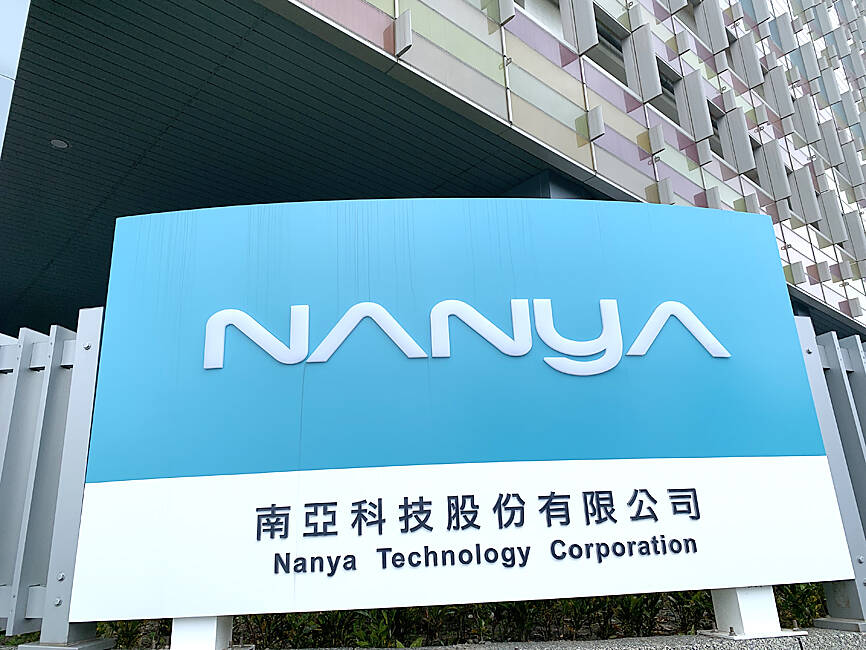DRAM chipmaker Nanya Technology Corp (南亞科技) yesterday said the US tariffs would not have a devastating effect on the company, as it is working with customers to mitigate cost increases during the 90-day reprieve of US President Donald Trump’s “reciprocal” tariffs.
Despite a baseline duty of 10 percent that remains in place under Trump’s tariff policy, the company only exports a limited portion of its chips directly to the US, although US customers accounted for a significant portion of its revenue, Nanya Technology president Lee Pei-ing (李培英) told an online earnings conference.
The latest development is already a positive twist as compared with a week ago, Lee said.

Photo: Grace Hung, Taipei Times
“Our customers are seeking to reduce the tariff impact. We are also cooperating with them to make some adjustments,” he said.
US-based Micron Technology Inc started to impose a tariff-related surcharge on some products such as memory modules and solid-state drives from Wednesday, Reuters reported on Tuesday.
Nanya Technology has no plans to hike DRAM prices for the time being, Lee said.
The company expects improving market demand to drive DRAM prices higher this quarter, as China’s stimulus packages are spurring sales of consumer electronics, Lee said.
DRAM prices last quarter dropped by a low single-digit percentage sequentially, he said.
On top of that, robust demand for high-bandwidth memory and high-density DDR5 DRAM chips are helping cut standard DRAM chip supply from the world’s major memorychip manufacturers and supply chain inventory, he said.
The anticipated DRAM price upticks are expected to help support the company’s gross margin to return to the positive territory this quarter, from minus-15 percent last quarter, Lee said, adding that the price increases would have been higher without the disturbance of US tariffs.
The company attributed the lackluster gross margin last quarter to the production transition from 20-nanometer technology to its second generation of 10-nanometer-class technology, which resulted in a lower yield rate.
The technology upgrade is necessary, as it allows the company to produce high-density and high-speed DDR5 DRAM chips used in cloud-based servers and edge devices beyond standard DRAM chips, the company said.
With the yield rate improving, the adverse effect would fade at the end of this quarter, it said.
Nonetheless, it would take time to see the company’s bottom line return to the black, although the situation would improve quarter by quarter this year, Lee said.
Nanya Technology yesterday reported that losses last quarter widened to NT$1.94 billion (US$59 million), compared with NT$1.57 billion the previous quarter. That marked a 10th consecutive quarter of losses.
The company plans to spend NT$19.6 billion in capital expenditure this year, up 21.7 percent from NT$16.1 billion last year.

SELL-OFF: Investors expect tariff-driven volatility as the local boarse reopens today, while analysts say government support and solid fundamentals would steady sentiment Local investors are bracing for a sharp market downturn today as the nation’s financial markets resume trading following a two-day closure for national holidays before the weekend, with sentiment rattled by US President Donald Trump’s sweeping tariff announcement. Trump’s unveiling of new “reciprocal tariffs” on Wednesday triggered a sell-off in global markets, with the FTSE Taiwan Index Futures — a benchmark for Taiwanese equities traded in Singapore — tumbling 9.2 percent over the past two sessions. Meanwhile, the American depositary receipts (ADRs) of Taiwan Semiconductor Manufacturing Co (TSMC, 台積電), the most heavily weighted stock on the TAIEX, plunged 13.8 percent in

A wave of stop-loss selling and panic selling hit Taiwan's stock market at its opening today, with the weighted index plunging 2,086 points — a drop of more than 9.7 percent — marking the largest intraday point and percentage loss on record. The index bottomed out at 19,212.02, while futures were locked limit-down, with more than 1,000 stocks hitting their daily drop limit. Three heavyweight stocks — Taiwan Semiconductor Manufacturing Co (TSMC, 台積電), Hon Hai Precision Industry Co (Foxconn, 鴻海精密) and MediaTek (聯發科) — hit their limit-down prices as soon as the market opened, falling to NT$848 (US$25.54), NT$138.5 and NT$1,295 respectively. TSMC's

TARIFFS: The global ‘panic atmosphere remains strong,’ and foreign investors have continued to sell their holdings since the start of the year, the Ministry of Finance said The government yesterday authorized the activation of its NT$500 billion (US$15.15 billion) National Stabilization Fund (NSF) to prop up the local stock market after two days of sharp falls in reaction to US President Donald Trump’s new import tariffs. The Ministry of Finance said in a statement after the market close that the steering committee of the fund had been given the go-ahead to intervene in the market to bolster Taiwanese shares in a time of crisis. The fund has been authorized to use its assets “to carry out market stabilization tasks as appropriate to maintain the stability of Taiwan’s

In a small town in Paraguay, a showdown is brewing between traditional producers of yerba mate, a bitter herbal tea popular across South America, and miners of a shinier treasure: gold. A rush for the precious metal is pitting mate growers and indigenous groups against the expanding operations of small-scale miners who, until recently, were their neighbors, not nemeses. “They [the miners] have destroyed everything... The canals, springs, swamps,” said Vidal Britez, president of the Yerba Mate Producers’ Association of the town of Paso Yobai, about 210km east of capital Asuncion. “You can see the pollution from the dead fish.